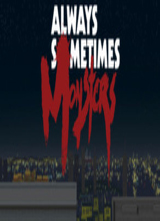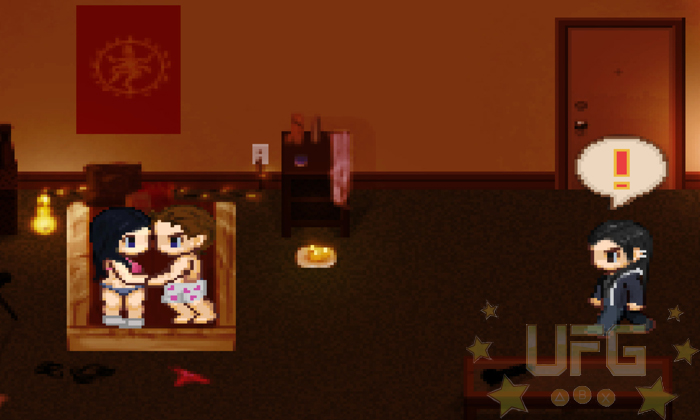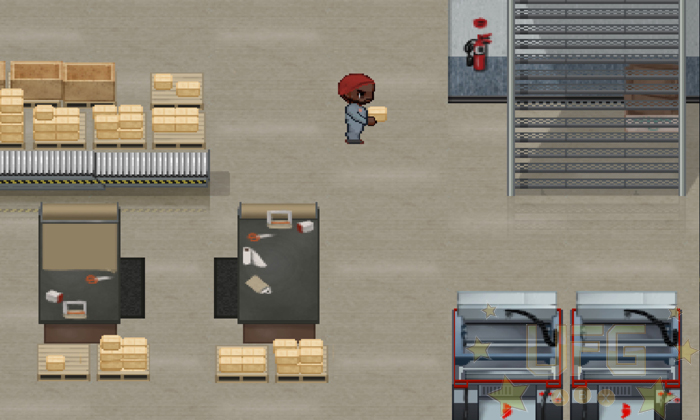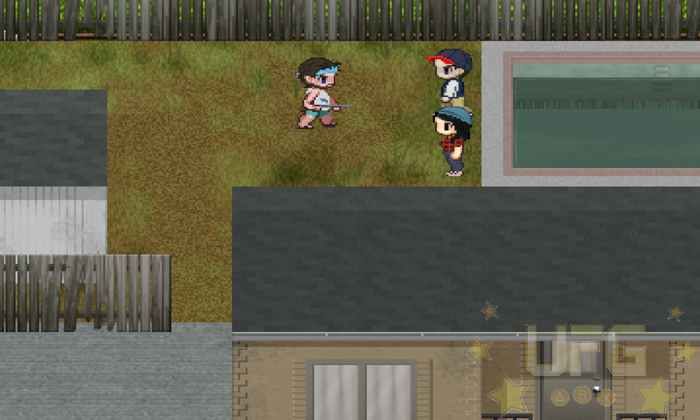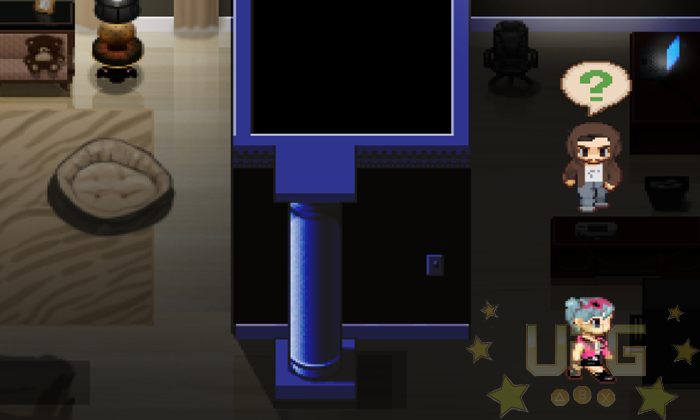Always Sometimes Monsters
One of the worst things you can do as a gamer is get too excited about an upcoming title. This early perception of quality can lead to a rash judgment on our actual experience after playing; an over glorified game may seem bad if it doesn’t live up to every ounce of hype placed upon it before launch. This is why you should take this next statement with a grain of salt. I personally didn’t enjoy playing Vagabond Dog’s Always Sometimes Monsters!
Always Sometimes Monsters (ASM) is based on the real-life events of Vagabond Dog co-founder Justin Amirkhani. The story follows an unemployed writer who hitchhikes across the country in pursuit of an ex-girlfriend after getting an invite to her upcoming wedding. As the protagonist treks from place to place, they’ll have to make plenty of decisions along the way. Most decisions, if not all, will have a lasting effect on the cast of characters. Something as simple as choosing to help a neighbor at a critical time could lead to something worthwhile. Or it could interfere with the end goal of making it to the wedding on time. Everyday struggles like finding a place to sleep or food to eat is just as important as overcoming sticky situations with shady characters. To make a long story short, gamers are forced to examine their choices in ASM and try to make sense out of the chaos (or lack thereof). Right and wrong are subjective depending on the person and their circumstances.
On paper it’s a recipe for a captivating narrative. Unfortunately, the actual game isn’t very fun to play. Now before you go “that’s the point”, let me explain what I mean. ASM deals with making choices, that part is evident in just about every piece of marketing dealing with the game. What isn’t apparent is how tedious most of the experience is. This stems from poor pacing and a lack of engaging content. You see, though the game starts out interesting enough, the main story seems to take a back seat to more mundane affairs. Early on it’s revealed that the main character is late on their rent and doesn’t have a job; they’re waiting on a check from their publisher. In order to get some much needed cash, taking on odd jobs is the best bet. Ranging from freelance writing for a local newspaper to preparing baggies of medicinal weed, each job was its own mini-game of sorts that would earn the player a few bucks each day.
One of the issues was in how boring the jobs were to do. Regardless of how long they took to complete they weren’t fun in the slightest. At first this didn’t bother me; my thought was that the developers wanted to simulate actual work. Maybe by doing these jobs I’d better understand my character’s plight. Like, dealing with the frustration of receiving lousy pay after a day’s worth of hard work. Life is rough, I get it. But these experiences didn’t translate into any type of empathy for my character or his situation. Any frustration that was felt had to do with not being able to get back to the main story. My character’s immediate issues took center stage and they weren’t as interesting as what was presented at the beginning of the game.
Adding to this is the passage of time. The day won’t progress unless you complete a job or do something else significant. There are times when at the start of a day, you’ll be prompted to talk to someone about current events. After doing so, the day will go from morning to noon (even though your character just woke up). Anything that needed to be done during the morning hours will have to wait till the next day. Whatever is available to do at midday – odd jobs or hearty chats with NPCs – will need to be done before night comes. The only thing to do during most nights is sleep. Then there are times where the game doesn’t hint at what should be done next. For me this often resulted in aimlessly walking around, clicking on things while the day was stuck at whatever hour it happened to be at that time.
To better paint the picture of what I was experiencing, there was a point in the game where I needed to make enough money for a bus ticket out of town. The only option I had was to continue to take odd jobs from an unemployment office; I guess I had already exhausted all of my talking points because the NPC’s in the area just repeated the same catchphrase over and over when clicked on. This was the worst kind of grinding as nothing interesting was happening. I wasn’t slaying monsters or crafting items, I was planting seeds in a garden.
When I did have opportunities to interact with NPCs, most of the decisions I made didn’t seem to matter in the grand scheme of things. Most of the time when they did matter, I found myself not caring about the outcome. This was due to two things: one being the fact that the game didn’t force you to confront the affected NPCs, at least not until the end of the game (more on that later). This could have been because of how I was approaching certain problems – always taking the “right” path seemed to give dull results – so, in an effort to shake things up as well as bypass some needless grinding, I opted to do something inherently bad. The result, someone getting hurt, was predictable. However, I never had to speak to the person or their family members. And though I can imagine what it would be like to confront them, it wasn’t enough to invoke any feelings of guilt. The other thing was how absurd some of the encounters were. In order to get some cleaning materials from a character, I’d have to prove I wasn’t a cop by doing meth. Who would choose such a thing? It was such a nonsensical notion that I started to become less engaged with what was going on.
The last thing that bothered me was the fact that despite housing a crazy amount of player choice, things felt scripted. If I were to place ASM on a scale where the ends featured titles like Telltale’s Walking Dead series and Ice Pick Lodge’s Pathologic, ASM would be right before The Walking Dead. In Pathologic, there is a real sense of urgency as the game progresses regardless of what you do. Outside of the main story threads, there’s nothing pushing you in any particular direction, making your every choice extremely important. With the Walking Dead, you’re given the allusion of choice while being guided on rails. While there may have been different story beats (like a character dying in your game sooner than in mine) for the most part the ending was the same for everyone. That said, the Walking Dead focused on how the world perceived your character; Lee left a mark on the world that resonates even in season two.
In Always Sometimes Monsters, I felt like I had even less of a contribution than The Walking Dead because of preset elements. For instance, I was talking with a character who wanted to know why I was dumped by my ex. Because I wasn’t given any clues beforehand, I just picked one of the options given. Later, during a flash back, I was shown how the relationship ended (the way I said it did). The thing is, no matter my answer the end result was the same. I still got the same response from the person I was talking to, my character didn’t get any insight or life lesson – I was the same person I was before I answered the question. I felt like I was prompted to make a choice just for the sake of making one.
The only thing that really stood out was towards the end of the game, when a particular character confronted you over your past actions (depending on how you played). Without knowing the whole story, they judge your motives. It was unfair and in some cases, upsetting – basically the most realistic encounter in the whole game was held to the one moment when you were actually forced to confront someone. And it was awesome!
I said all of that to say this – it’s very possible that my play through wasn’t as deep as I thought it would be because of my preconceived notions. The trailers for ASM where haunting in their design; the red font and the hints at violence made me think this was going to be something that was thought provoking. I guess I was looking for something deeper than what was offered. Also, it could have been based on my choices. It’s possible that if I had played as a girl/gay/someone completely different than myself, things might have been different. That said, I don’t think I’d want to go through the game again. The gameplay isn’t fun on a basic level and the theme boiled down to stuff happens when choices are made. And sure, I can understand not wanting the experience to be “enjoyable” in order to simulate a hard life. Most of what happened during my playthrough, just didn’t mean much of anything to me or even to the main character.
Gameplay:
5
The idea is great, but the implementation needed some work. Most of the game is rather boring.
Graphics:
8
I’m a fan of the retro graphics.
Sound:
7
The music is great. It doesn’t paint the moods well, but was catchy most of the time.
Replay Value:
5
I have no desire to replay this game. Again, it’s possible that you may experience a better story by making different choices. That said, the lackluster gameplay would most likely still be there.
Final Score:
6.3
